Exclusive: Why NY State Police say Orange County DA undermined Megan McDonald murder case
On Jan. 29, 2024, an Orange County grand jury indicted Edward Holley for second-degree murder in the 2003 death of Megan McDonald. This exclusive report, built on documents obtained by the USA Today Network New York, reveals the conflicting interests of those in power and how they shaped the path toward prosecution.
For two decades, New York State Police had hunted Megan McDonald’s killer. In the spring of 2023, they were finally prepared to make an arrest, and they were convinced of two things.
First, that they had their man: Edward V. Holley.
Second, that they needed to get another man out of the picture, someone they were convinced had long undermined their investigation: Orange County District Attorney David M. Hoovler.
Hoovler, it turns out, had a link to the McDonald homicide, a connection he hadn’t divulged to the public for more than 15 years, and still hasn’t fully revealed.
When he was a defense lawyer in 2008, before being elected DA, Hoovler approached the DA's office with details police said "only the killer would know." It was five years after McDonald's murder. Hoovler said his unnamed client could tell investigators all about the night of the murder, about the murder weapon, a Stanley ball-peen hammer, where they could find it, and who was involved.
Hoovler, in conversations with the DA’s office he would later lead, said police could crack the case if the deal was right for his client: He suggested probation or a 3-to-9-year sentence for manslaughter.
Hoovler kept his client’s identity a secret. Then the investigation led away from his client and Hoovler cooled to talk of a plea deal. He kept the DA’s office at bay with shorter and shorter conversations and fewer and fewer details.
In 2010, his client, Andre Thurston, died of a drug overdose.
In 2013, Hoovler was elected Orange County’s district attorney.
The USA Today Network New York has obtained a blistering State Police report from the McDonald case file that lays the investigation bare and reaches a jaw-dropping conclusion: That Hoovler’s past representation of one of the alleged killers in the case colored his decisions as district attorney and that he deliberately tampered with the investigation.
The internal State Police report also raises serious questions about Orange County Judge Craig Stephen Brown. It says Brown asked a police investigator if Brown’s brother-in-law was a suspect in the McDonald murder, and then went on to deny two search warrants. Brown continued to hear applications in the case in recent months as special prosecutor Julia Cornachio presented the case to the grand jury.
READ A JUDGE'S PHONE CALL RAISES QUESTIONS
The report documents the deep distrust police had for Hoovler and his office. It suggests the pattern of Hoovler’s actions led police at the highest levels to conclude they had to take extraordinary steps to bring Holley to justice in Orange County’s stubbornest cold case.
How deep was the distrust?
State Police from Middletown to Albany worried that if Hoovler ever put the McDonald case before a grand jury, he would intentionally botch it.
A family waits for answers
The State Police report is 25 pages among boxes of McDonald case interviews and evidence now in the hands of Special Prosecutor Julia Cornachio and Holley’s lawyer, Paul Weber. It tracks the investigation while charting the role Hoovler played in shaping — the police report would say hindering — it.

The unsigned document was written by Lt. Brad Natalizio, who oversaw the investigation from 2017 to 2022. It covers events from the discovery of McDonald’s body on March 15, 2003, until April 25, 2023. That’s the day Hoovler informed the McDonald family, five days after Holley’s arrest, that he would recuse himself and his office and hand the case to a special prosecutor.
Hoovler’s recusal, coming a decade after he became DA, surprised those following one of Orange County’s most well-known unsolved crimes.
READ WHO'S WHO IN THE MEGAN MCDONALD CASE
Megan McDonald was a vivacious 20-year-old — a 5-foot-2, 100-pound life of the party — who graduated from John S. Burke Catholic High School in 2000. In March 2003, she was taking classes at SUNY Orange Community College and waitressing at American Café restaurant in the Galleria Mall at Crystal Run in the town of Wallkill.
Her father, Dennis, an NYPD detective who investigated the 1993 bombing of the World Trade Center, had died a year before, a shock the McDonald family was still coming to grips with in 2003, when tragedy struck again.
Megan McDonald was last seen alive on March 13, 2003, driving her white Mercury Sable through her old Greenway Terrace neighborhood at about midnight. There was a birthday party going on for a friend, but she stayed in her car. Police believe there was someone at the party she didn’t want to see.
Then she vanished. Two days later, on March 15, her bludgeoned body was discovered in a field off Bowser Road in the town of Wallkill. Her skull was shattered. She was dead.
The discovery triggered a massive investigation that would include hundreds of interviews and more than 1,001 leads. The McDonalds would have to wait 20 years for an arrest. When it finally came, the family's relief was short-lived, as a legal loophole meant Holley could not be held in jail.
Hoovler stepped aside and a special prosecutor would first have to review 20 years of evidence and interviews before the case would move forward.
The McDonalds would have to wait even longer.
David Hoovler's last-minute recusal
The State Police report sheds light on a bizarre chain of events surrounding Holley’s April 20 arrest, when the DA wasn’t at the podium on what should have been a banner day in the case.
Police arrested Holley without notifying Hoovler, who had been adamant behind the scenes that the case was not ready to be tried. Hoovler had repeatedly insisted it was up to him as DA whether the case would go to a grand jury. The report portrays his behavior as bizarre and frazzled, as he was by turns panicked and furious with police and his staff.
The report also says Hoovler asserted that district attorneys decide whether there is a conflict of interest in a case. And he had concluded no such conflict existed with him in the McDonald case — until he recused himself at the 11th hour, when police went around him to arrest Holley.
One thing is clear, from the report itself and from interviews conducted with key players in the case to corroborate its timeline and characterizations: There was a lot of bad blood there. And that bad blood fueled decisions at the highest levels of the State Police in Albany, at the Middletown Troop F barracks and at the DA’s office in Goshen. Those decisions affected the way the McDonald case was handled and will be viewed going forward.
The State Police would not comment on the report. Spokesman Steven Nevel at Troop F in Middletown, where the McDonald investigation was handled, and Deanna Cohen, acting director of public information at State Police headquarters in Albany, said no member of their force would speak about an ongoing case. Not Lt. Brad Natalizio, the report's author. Not McDonald lead investigator Michael Corletta. Not BCI Capt. Joe Kolek.

Cornachio, the special prosecutor, said she wouldn't comment during an active investigation. But she did add: "I've had no issues at all with either the district attorney's office or Judge Brown, as far as anything that I have needed to pursue or to investigate."
What’s not in the report
There is plenty in the internal report, and plenty that’s not. It gives the State Police version of facts and paints Hoovler in stark and unflattering terms.
While it looks at the opportunities police say Hoovler took to hamstring their investigation, it doesn’t address a possible motive. Why would the county’s top law enforcement official do what he’s accused of doing here?
Was it the fear of losing a high-profile murder case?
Was it political? Did he fear voter backlash when the extent of his involvement with a McDonald suspect came to light? (If Hoovler seeks reelection, it would be in 2025.)

Was it personal? Hoovler’s sons attended Burke Catholic and the Burke Catholic community still mourns Megan McDonald; a stained-glass window in the student chapel is dedicated to her memory. Did he fear what the Burke Catholic community would think of him for taking on such a client, a man suspected in the death of one of their own? How many times had he been asked, at Burke football tailgates and rallies, about the McDonald case and if it would ever be solved? Was his identity as a “Burke dad” a consideration?
Was it about pride? Did Hoovler refuse any request to recuse himself from the case because he wanted to be the one to solve it?
Was he protecting someone?
The report doesn't address it, so we asked David Hoovler.
David Hoovler responds
In early November 2023, the USA Today Network sent Hoovler eight specific questions about the report and his decision-making in the case, and offered to sit down with the district attorney at any time to ask him more. Within days, he replied with a statement via email.
"The ethical rules regarding pre-trial publicity, the order appointing the special district attorneys, and the duty I owe to a former client are very clear and prevent me from commenting upon the evidence or answering your questions," he wrote. "However, any suggestion that I, or anyone in my office, did anything to 'tamper with,' or in some fashion compromise the investigation into Ms. McDonald's death is as categorically false as it is offensive."
Hoovler said he never denied State Police "any resource to pursue any investigative avenue that might advance this investigation and bring closure to Ms. McDonald's family, as well as our entire community." Rather, he said, he approved spending "tens of thousands of dollars on sophisticated and cutting-edge scientific testing and I have explored the use of novel technologies never previously admitted in the courts of New York — all in an effort to solve this 20-year-old homicide."
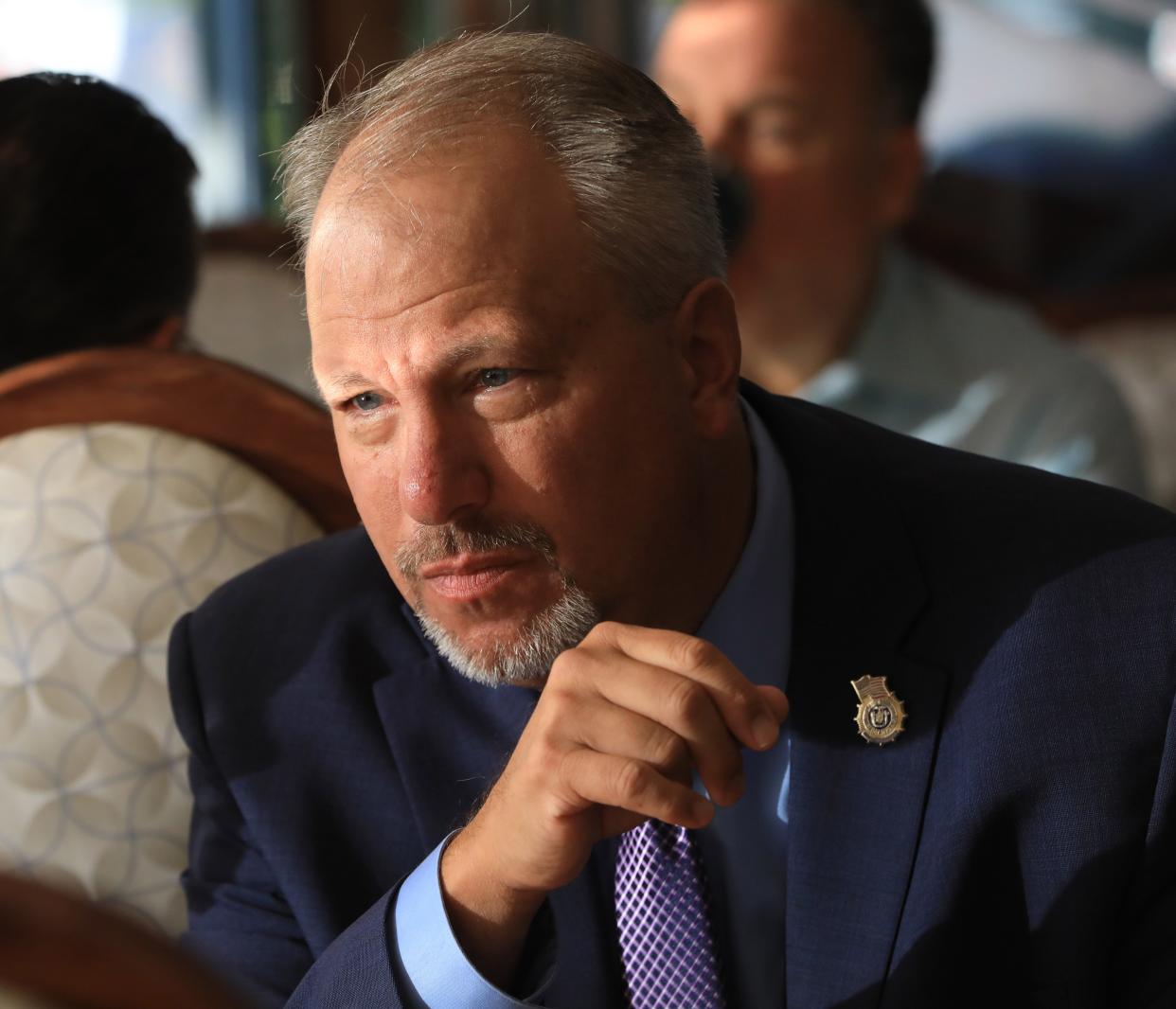
As recently as a month before the arrest, Hoovler said, he told the police he would spend an extra $40,000 on expert witnesses and would spend whatever was necessary on the investigation.
Hoovler said police were "well aware of my representation of Mr. Thurston prior to my taking office in 2014." But the report says Hoovler did not identify his former client by name until 2019.
Regarding his late recusal, Hoovler said "the court agreed with my view that after the arrest, my representation of Mr. Thurston raised the prospect of an appearance of impropriety and issued an order appointing two highly qualified prosecutors." Hoovler said his office has "extended them every courtesy as they pursue the investigation" and he hopes they are "able to successfully navigate the many complexities presented by this matter."
In late January 2024, Hoovler issued a second statement to the USA Today Network New York, expanding on the limits placed on him to comment.
“A prosecutor is ethically required — even to the great disappointment of the public — to refrain from accusing anyone of criminality, unless and until sufficient evidence is gathered to support such charges against an individual to the exclusion of all other suspects. This ethical rule has particular application with regard to any notorious case from the distant past where the understandable desire for resolution weighs heaviest.”
In an accompanying interview, Hoovler again defended the cooperation the police received from his office, which, he said, included “over 233 requests over nine years, every one of them was granted.” Those requests, he said, ranged from ”subpoenas to DNA to manpower to legal advice.”
“Anything they asked for they got,” Hoovler said. “I'm not talking about anything in the seven months the special prosecutor has had the case, I'm talking about up till the day they made the arrest. Everything they asked for they got. There is no claim they can make that they didn't get it. The only thing that they didn't like was 'get more evidence.'”
The McDonald family, through Karen and James Whalen, Megan's sister and brother-in-law, responded.
"It was a knife in our hearts for Ed Holley to go free, due solely to the actions of David Hoovler," they said. "David Hoovler, who chose not to attend the press conference announcing Ed Holley’s arrest and refused to appear in court himself to announce his recusal.
"He can pretend to be outraged at this reporting," the family said, in advance of the indictment, "but everyone involved in the case knows a simple truth: Because of David Hoovler, Ed Holley has not spent one night in jail for the murder of Megan McDonald."
A plea offer kept from police
Among the report’s most stunning twists came in March 2022.
Amid a big media push on the 19th anniversary of McDonald’s slaying, the USA Today Network published an article titled “Catching the Coward” with never-before-revealed details of the case. Police hoped it would prompt Holley to slip up, to reveal key bits of evidence.
At the time, Holley’s wife was in county jail on a parole violation. Holley was free.
When police listened to recorded jail phone calls between the couple in the days after the article was published, investigators were shocked by what they heard.
Holley told his wife that “the head DA” had called his lawyer and sought a meeting. Holley said the DA told them Holley was the prime suspect in the McDonald murder and warned Holley that law enforcement might be listening to his telephone calls.
Then, Holley told his wife, Hoovler offered him a deal. If he told what he knew, Holley wouldn’t have to serve time in a maximum-security prison.
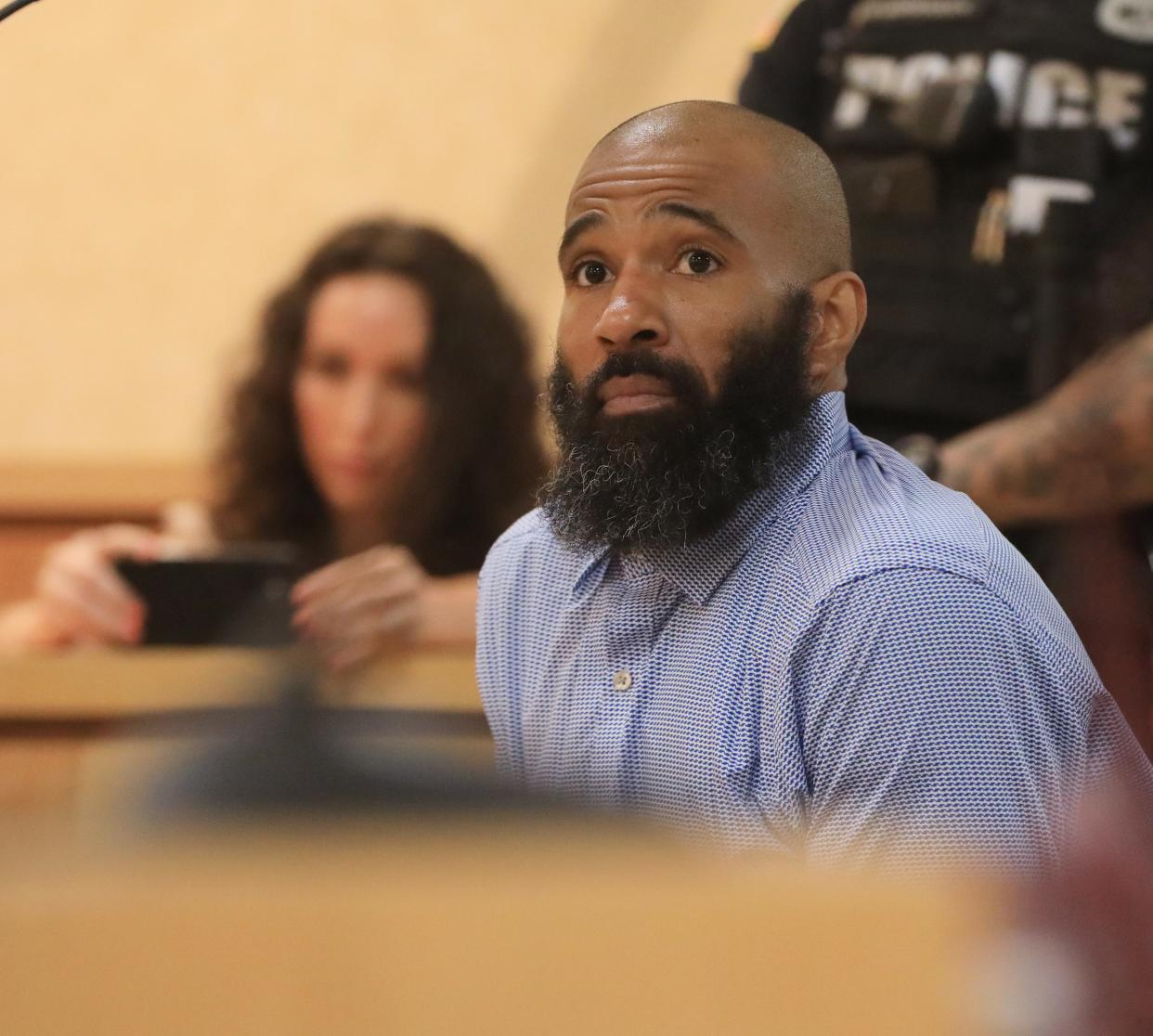
Police listened, dumbfounded. Just as they were closing in on their man, they felt Hoovler was directly tampering with their investigation. And the only way they learned about the “proffer” was from the jail recordings.
Police believe Hoovler’s actions also shut off a key investigative pipeline: The jail calls, which had provided important leads and a window into Holley’s thinking, stopped immediately.
It would be more than a year before they put Holley in handcuffs in the McDonald case, and the report’s narrative helps to explain the unusual happenings around the arrest:
Holley was arrested without an indictment after a 20-year investigation;
Hoovler was a no-show at the arrest press conference;
Holley was released from custody less than a week after his arrest;
Hoovler finally stepped away from the case after the arrest, citing “a substantial appearance of a conflict of interest” he had not raised in his previous nine years as DA.
After Hoovler recused himself, Cornachio, a veteran Westchester prosecutor, was named special prosecutor, with fellow former Westchester prosecutor Laura Murphy, a cold-case expert, as co-counsel. They put the case before an Orange County grand jury, which handed up a single second-degree-murder indictment on Jan. 29, 2024.
The narrative of the State Police report goes deep into the investigation and the push and pull between police and the prosecutors. Its conclusion is damning: Hoovler, it says, acted as he did because he had represented a man named Andre Thurston.
What happened that night
Andre Thurston was listed as “Suspect #2” in the 17-page felony complaint against Edward Holley. Thurston had been David Hoovler’s unnamed client in 2008, when Hoovler approached the DA’s office about a possible plea deal.
The felony complaint lays out a timeline for McDonald's final hours, which were spent looking for marijuana.
Typically, she would have sought out Holley, her principal weed supplier, but McDonald had broken off their physical relationship in recent days over money that Holley owed to her, police said. She drove around to other possible sources, but came up dry. Along the way, she picked up Thurston, a friend, who sat in the front passenger seat.
With no other source for marijuana, she turned reluctantly to Holley. She was behind the wheel, Thurston to her right, Holley alone in the back seat as March 13 turned to March 14.
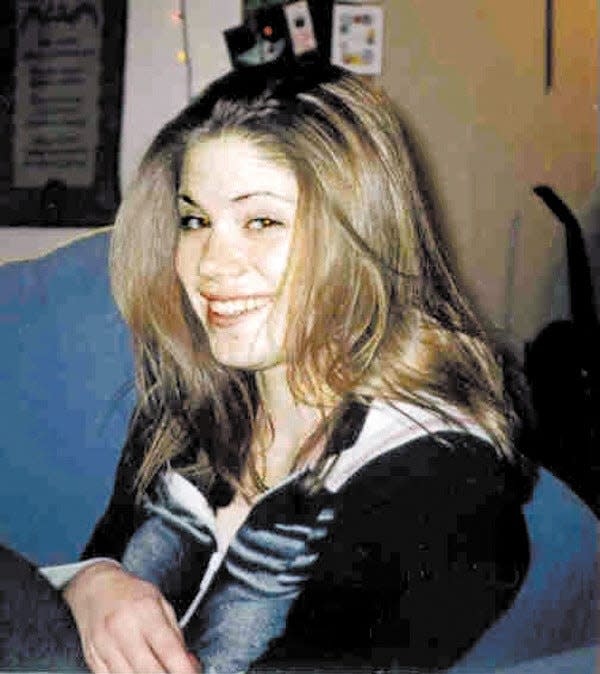
When McDonald parked her Sable off Bowser Road, something snapped in Holley, police believe. He struck McDonald from behind with the hammer, unleashing blow after blow, ending the 20-year-old’s life and rendering her face unrecognizable to first responders.
But police hadn’t developed that timeline in April 2008, when Hoovler, then a new defense lawyer, phoned Senior Assistant District Attorney John Geidel and offered the promise of a break in the case.
Hoovler knew the DA’s office he was dealing with. He was just weeks into his new job at Chester-based law firm Ostrer Rosenwasser LLC, fresh from a position with the U.S. Department of Justice. Before that he had served for years as an assistant district attorney under Orange County DA Frank Phillips.
He 'knows where the hammer is'
Thurston, his client, was nervous in the spring of 2008.
He believed police were closing in on him. He wanted Hoovler to trade information for a plea deal. Hoovler called Geidel, who sent Hoovler’s tip to Assistant District Attorney Maryellen Black Albanese. She had been handling the McDonald case since the day the young woman’s body was found.
Albanese was on a trial when Hoovler called Geidel. By the time she reached Hoovler, it was July 30, 2008.
In their first call, according to Albanese's notes, Hoovler told Albanese: “I have a client who approached me about potentially negotiating a deal. He was involved in the Megan McDonald case. The bottom line is he could produce two others who were involved and he had some information that a Stanley ball-peen hammer was used.” Later, he added, his unnamed client “knows where the hammer is” and it was part of “a 3-piece set, maybe.”
Albanese asked if his client was a principal or an accomplice. “Principal or accomplice, there’s very little distinguishing that here,” Hoovler said. “They were all acting in concert."
Albanese's notes never mention the "two others" again.
Hoovler told Albanese that police were following the wrong theory in the case, that the murder wasn’t about drugs. He said his client “wanted to be able to sleep,” but later clarified it was not guilt that was keeping his client awake, but the threat of impending arrest.
Hoovler said he told his client not to come forward “unless police were knocking on his door.” He didn't offer up Thurston’s name — and would not until 2019, when he had been DA for more than five years.
Albanese in 2008 learned nothing about Hoovler’s client for investigators to act on. Police had interviewed Thurston several times, not knowing he was Hoovler’s client, but followed leads elsewhere. As Thurston felt the threat of arrest ease, he lost interest in plea discussions.
Over the course of three years, Albanese would check in with Hoovler regularly, trying to tease out what his client knew and what it would take to get him to tell it. But the route to Hoovler’s client dried up.
Then, on March 20, 2010, Thurston was dead, a drug overdose days after the 7th anniversary of McDonald’s death. Thurston died without revealing to investigators what he knew about Megan McDonald’s last hours.
Hoovler remains bound by attorney-client privilege not to reveal what his client told him. What State Police know is that Hoovler had information to trade, had been ready to deal, and that his client’s role could have merited a manslaughter charge.
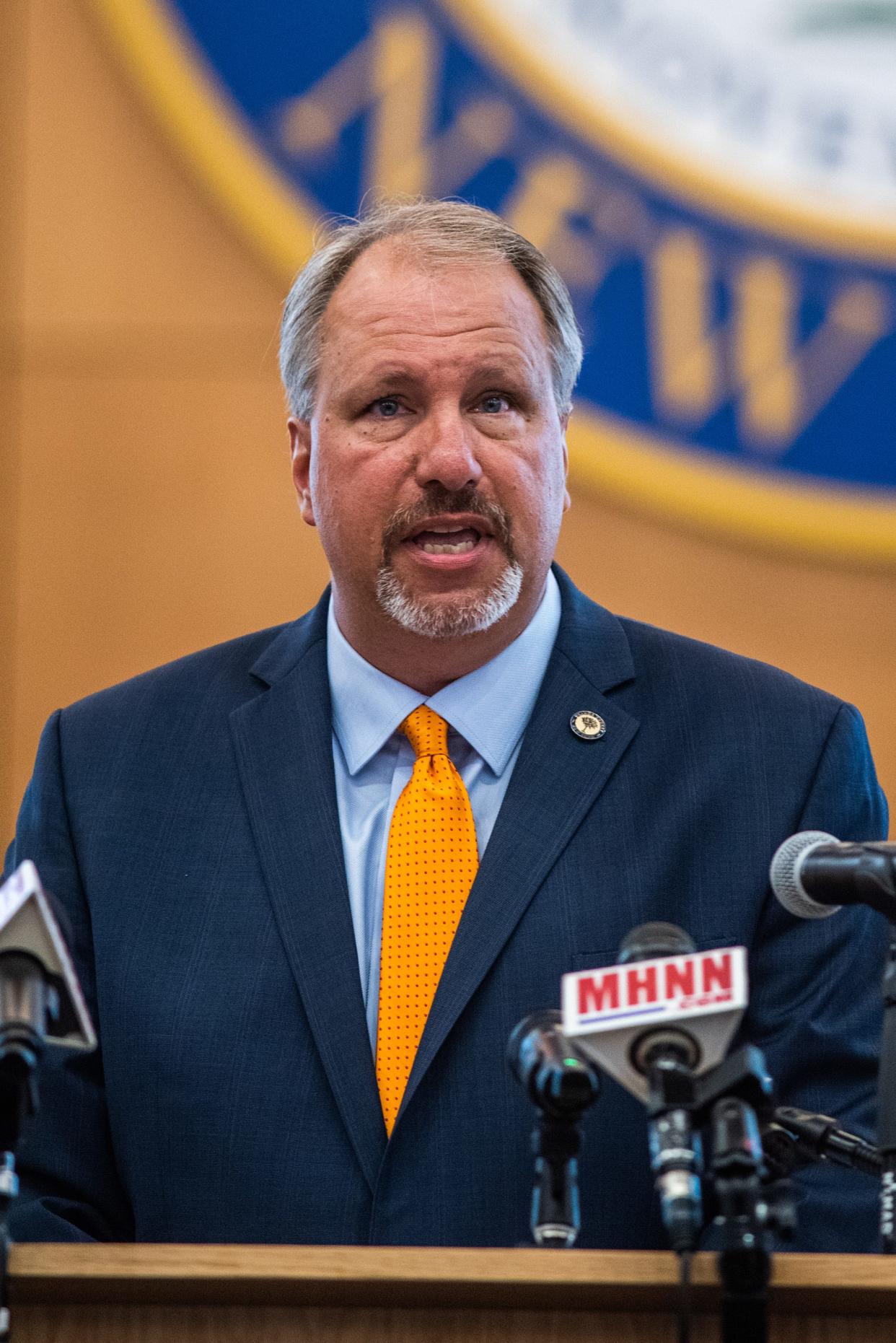
The State Police report and Albanese’s notes reveal that Hoovler has a plea-deal vocabulary, whether acting for the prosecution or the defense. When Hoovler made his plea pitch to Holley and his lawyer in March 2022, he used the same language about police “knocking on your door” that he had used when trying to secure a deal for Andre Thurston in 2008.
Back then, he had said “unless police were knocking on his door,” Thurston should not come forward.
On Holley’s March 17, 2022, recorded call to his wife in jail, he told her that Hoovler had said: “When the State Troopers come knocking on your door to put them handcuffs on you, there’s not going to be a time for you to come ask me for a plea deal.”
The USA Today Network New York asked Hoovler directly about his efforts to secure pleas in the McDonald homicide. The question put to Hoovler was this: "You wanted a plea deal for Andre Thurston, 3 to 9 years for manslaughter. On March 17, 2022, you offered Ed Holley a plea that would soften the sentence if he told you what he knew. Was Megan McDonald’s life not worth the maximum penalty?"
Hoovler declined to answer the question directly.
READ MORE ABOUT THOSE PHONE CALLS – ON THE LINE WITH DAVID HOOVLER – HERE.
The time for a DA to recuse
Hoovler was elected DA in November 2013, nearly four years after Thurston died.
Albanese, in a recent interview, said that after Hoovler was elected but before he took office, then-DA Frank Phillips gave his staff an assignment.
“He asked for a list of cases in which any member of David Hoovler’s firm represented the defendant, indicating that cases not disposed by Dec. 31, 2013, would require the appointment of a Special District Attorney,” Albanese wrote in reply to questions from the USA Today Network. Albanese said she wrote Phillips about the McDonald conversations, that they hadn’t borne fruit and would not be resolved by year’s end “and necessitated turning the case over to a special prosecutor.”
“To my knowledge,” Albanese wrote, “a special prosecutor was never appointed.”
(Phillips, in a terse phone conversation recently, remembered it otherwise, saying that any decision about taking cases to a special prosecutor would have been Hoovler’s, not his.)
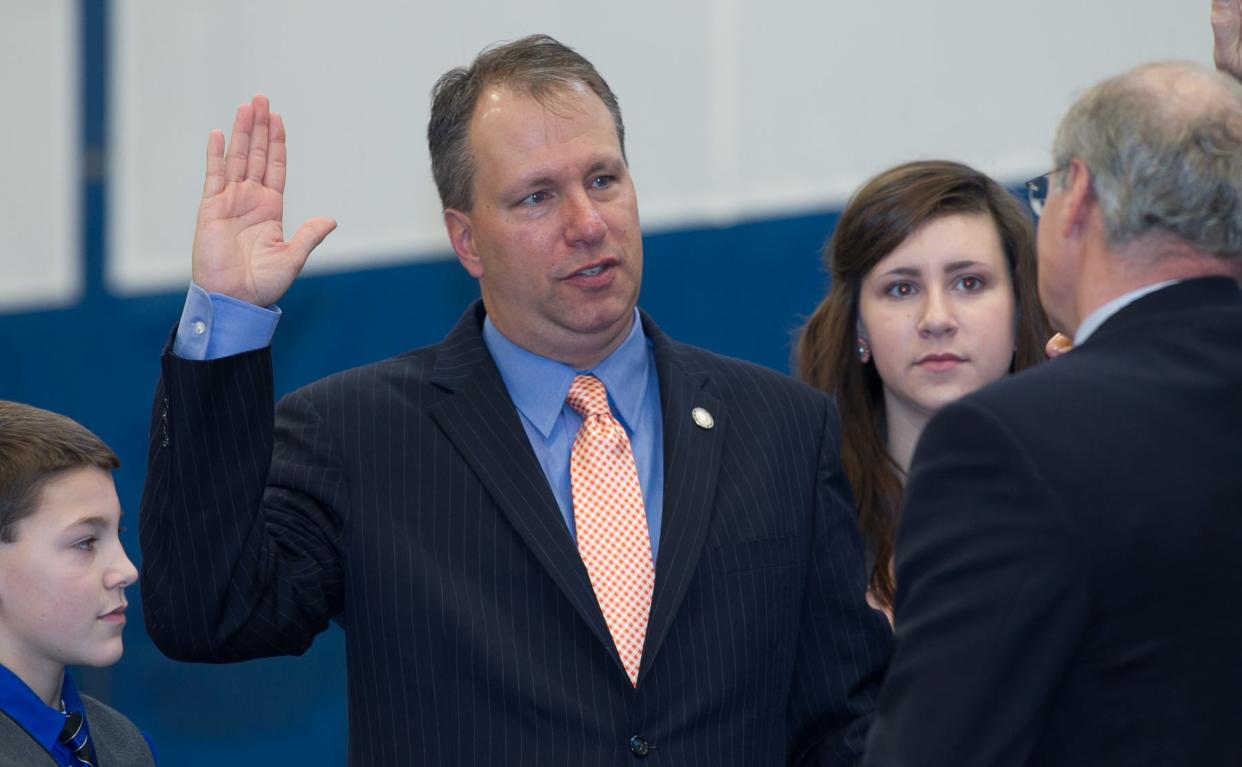
When Hoovler took office Jan. 1, 2014, there were myriad ways the new DA could have handled his pre-existing case load, including the McDonald case.
He could have identified active cases he had worked on as a defense attorney and recused himself from handling them as DA.
He could have waited until the first time investigators asked for a warrant or a subpoena in the McDonald case and recused himself then.
He could have called for a special prosecutor to guide the McDonald investigation.
He could have set up what lawyers call “a Chinese wall,” a chain of command within the DA’s office that would send all McDonald case decisions to a specific assistant district attorney, walling Hoovler off from any role in the case.
But Hoovler did not do any of those things, choosing to wait until after Holley was arrested to recuse himself.
Doing so was his prerogative, said Rick Trunfio, an adjunct professor at Syracuse University School of Law and Maxwell School of Citizenship and Public Affairs.
Trunfio’s 30-year legal career includes a long stint as chief assistant district attorney in Onondaga County, responsible for the office’s day-to-day operations. He also works with the District Attorneys Association of the State of New York.
Recusals, Trunfio said, are reserved for real and potential conflicts of interest, as well as an appearance of impropriety. The impropriety need not be proven; the appearance of impropriety is sufficient to trigger a recusal.
“A prosecutor who has a good friend or a relative who's been charged with a crime, the recusal stems from the appearance of impropriety and conflict of interest that that person may get favorable treatment,” Trunfio said. “That goes towards the integrity and the public confidence in the criminal justice system.
“The decision to recuse lies with the DA. It's in the DA's judgment,” Trunfio said. “That judgment may be judged later on, either by a court or by the court of public opinion.”
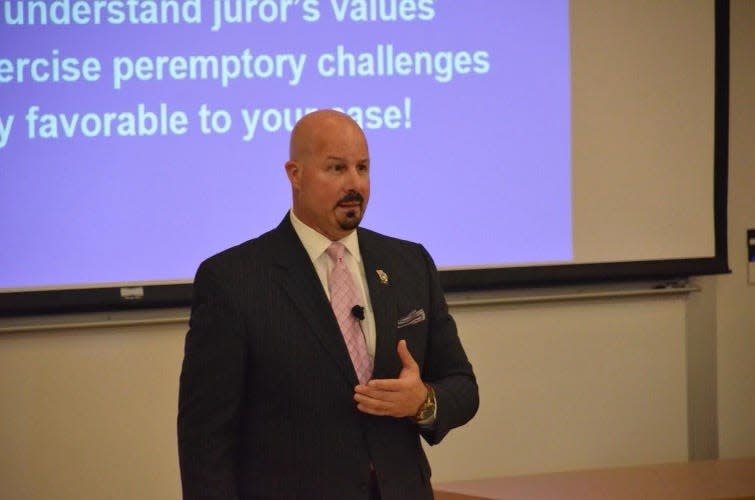
Trunfio said he’s not familiar with all the twists and turns of the Holley arrest but said one element is clear.
“There was something that triggered the State Police arresting without the DA's knowledge or approval,” he said. “And that was the triggering event that caused the recusal and the conflict of interest to jump to the forefront.”
What makes the Holley case messy, Trunfio said, is that in New York, police have what is called “summary arrest power,” which means they don't need the prosecutor's approval to make an arrest. Until an arrest is made, the DA has no formal role in the case.
“Should a prosecutor recuse themselves before there is any case pending before him? That's up to the prosecutor,” Trunfio said. But an arrest forces the issue.
“When the police made the arrest, and his office is responsible for prosecuting, that's when the conflict rises to the level of a recusal. It's a gray area before that,” Trunfio said. “Another DA may have raised the conflict or a potential conflict or recusal earlier in the timeline.”
The USA Today Network New York asked Hoovler why he chose the recusal path he did, waiting until after an arrest, more than nine years after he took office. He declined to answer.
But the McDonald family did answer.
Family assails David Hoovler
Asked if Hoovler should have recused himself on Jan. 1, 2014, when he took office, Karen and James Whalen, Megan's sister and brother-in-law, who speak for the family, said: "David Hoovler’s conflict of interest existed on day ONE. Hoovler woke up every single day between Jan. 1, 2014, and April 26, 2023 — a total of 3,402 days — and willingly chose not to recuse himself."
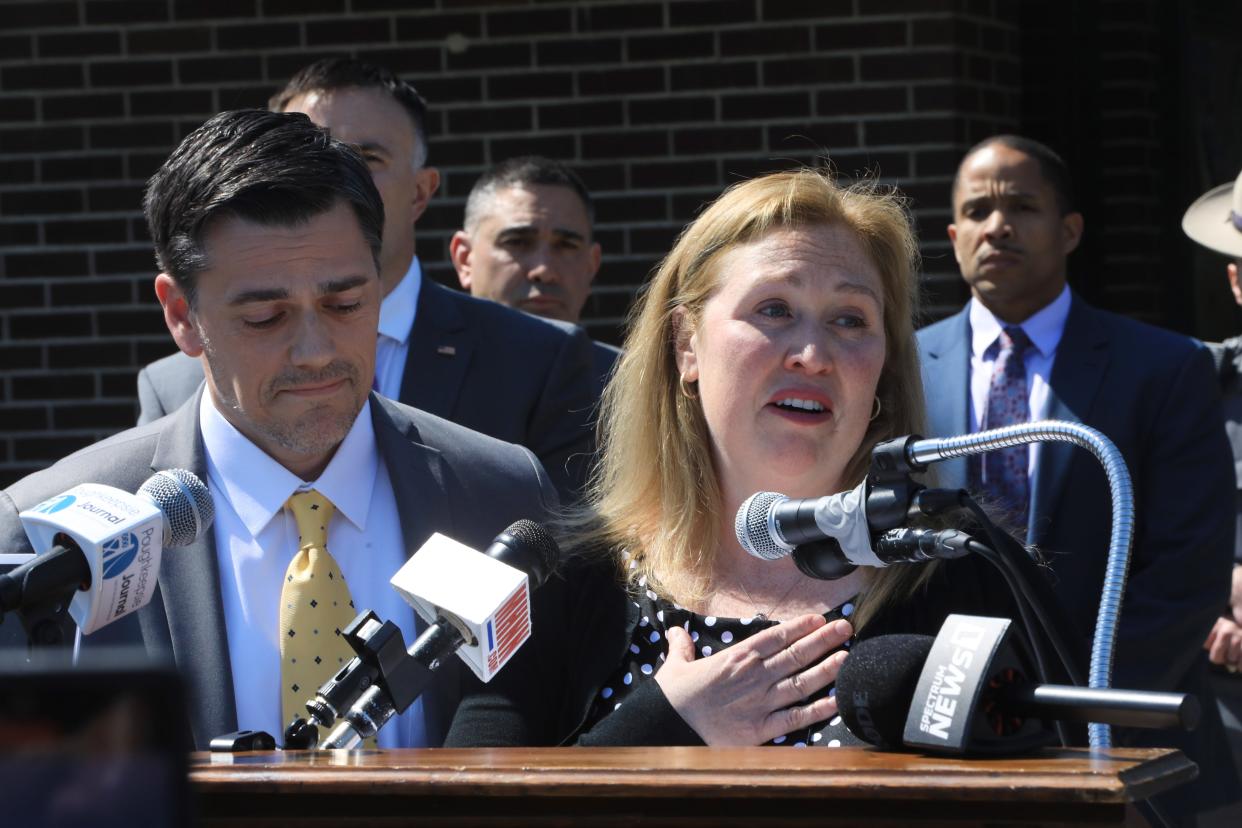
As for why he chose not to, the Whalens said: "David Hoovler’s conduct is so outrageous that it is hard to believe. He seems laser-focused on trashing the brave men and women of the State Police to hide his own conduct. We are convinced that there is far more to the story, and we suspect that David Hoovler is continuing to hide the truth and attack the State Police in order to keep his personal and professional lives and reputation from being destroyed."
READ MORE ABOUT HOW ONE DISTRICT ATTORNEY RECUSES HIMSELF
The family's attorney, John Beatty of Manhattan-based Beatty Law, PLLC, said in a statement: "The more I learn about David Hoovler the more apparent it is that his conduct now necessitates an investigation by an independent oversight body. And it’s certainly time for the New York Legislature to revoke its near-impenetrable immunity for prosecutors where it can be proven that they have acted inappropriately and violated the rules governing ethics and the oath of their offices.”
Hoovler’s actions delayed justice in this case, Beatty said.
"My office will continue to leave no stone unturned to find out the complete truth of what Dave Hoovler did, and why he did it," Beatty said. "We will seek all legal remedies against Hoovler and those in his office who were complicit in failing to properly and timely prosecute this case and refusing to recuse themselves."
Meanwhile, on social media
As DA, Hoovler's public face was as the county's No. 1 law enforcement official, eager to solve the McDonald case.
On Oct. 11, 2022, he took to his "David M. Hoovler Orange County DA" Facebook page and posted images of a Megan McDonald billboard offering a $10,000 reward and the Crime Hotline phone number.
He wrote: "It would be a great day to solve this case! Are you somebody, that holds the key information to solve this case? Come forward ... the system works when citizens participate! Make that call - tell us what you know ... you can remain anonymous!"
A story shifts
For nearly a decade, the State Police report says, investigators repeatedly asked Hoovler to recuse himself from the McDonald case. Time after time, he declared there was no need, downplaying his role representing a client and bristling at the suggestion that his past was somehow tainting his work.
“I’m the elected DA and I decide what cases go forward,” he declared.
In the report's narrative, his story changes slightly with each telling and those stories are contradicted by notes taken at the time.
In 2008, Hoovler the defense attorney would not name his client. Eleven years later — on March 20, 2019, the ninth anniversary of Thurston’s death — Hoovler for the first time named him as his client, in a meeting with police and members of his staff, the report says.
Edward Holley's attorney, Paul Weber, in a recent interview, voiced concerns about Hoovler's naming of Thurston.
"New York State Rules of Professional Conduct regarding attorney-client privilege specifically prevent an attorney from revealing information learned as a result of the attorney-client relationship and that privilege survives even after death of the client," Weber said. "There are several exceptions to that rule but the specifics of this case, as I see them, do not fall within any of those exceptions.
"If the allegations the State Police are making are true, it appears that there was a serious breach of the Rules of Professional Conduct," Weber said. "As for what repercussions there will be in the future, that remains to be seen. His former client's family has every reason to be upset if the allegations are true and the specifics do not fall within any of the exceptions."
READ MORE ABOUT ATTORNEY-PRIVILEGE HERE
According to Richard C. Lewis, president of the New York State Bar Association, one such exception is where a potential criminal defendant authorizes his attorney to try to negotiate a plea agreement.
Without commenting directly on the McDonald case, Lewis noted that criminal defendants basically authorize their attorney to provide information for the purpose of negotiating more favorable treatment from prosecutors.
Nina Schutzman is the mother of Thurston's son and the fiduciary of his estate. Efforts to reach her, through her father and attorney, Stanley Schutzman of Poughkeepsie-based Hanig, Handel and Schutzman LLP, were unsuccessful. Nina Schutzman is a former reporter for The Poughkeepsie Journal.
At that March 2019 meeting when he named Thurston, Hoovler told police and members of his staff that Thurston had said he had information about a homicide, but said Thurston did not specify to him which homicide. Albanese’s notes and the record of Hoovler’s initial call to Geidel refute this, saying Hoovler had identified the McDonald homicide from the outset as the one his client witnessed.
On April 26, 2022, Hoovler was the emcee for the county's Crime Victim Vigil at the Newburgh Armory Unity Center, where he introduced families whose lives had been shattered by crime. Among the speakers he introduced that night were Karen and James Whalen.
After, he took Natalizio aside, and asked the lieutenant how the case was coming along. As they spoke, Hoovler told Natalizio that he had represented Thurston on a drug case “but had little to no information about the details of the homicide or even Thurston’s involvement.”
When Natalizio mentioned Albanese’s notes — which show that Hoovler in 2008 had talked about the murder weapon and a manslaughter plea offer for Thurston — “Hoovler appeared to be flustered,” Natalizio wrote.
Hoovler asked Natalizio to meet him later that night at the D Lux Diner in Wallkill to talk through the case. There, Hoovler’s story changed again.
This is what Hoovler said at the diner, according to the report: Thurston came to Hoovler because he was worried he would be arrested for selling drugs once. Thurston said he had information about a homicide, talked about a murder weapon, and asked legal questions about being an accomplice, but never said the murder was McDonald’s.
Also: Hoovler told Natalizio that Thurston only came to Hoovler’s office once, he never heard from him again, and Thurston never paid him.
This scenario contradicts the notes from Hoovler’s first call to Geidel, which read: “(Hoovler) represented one of the persons involved in the murder of Megan McDonald and his client may be willing to turn themselves in if offered a plea agreement.”
At the diner, Hoovler told Natalizio that if ADAs Leah Canton and Stu Rosenwasser said there was enough evidence to make an arrest, Hoovler would sign off on it. But the DA warned Natalizio that he believed the prosecution would not win.
Nearly a year later, after Canton and ADA Chris Kelly had drafted a 26-page memo recommending the case be put before a grand jury, Hoovler changed his tune. Canton’s opinion on the case was no longer valid. He needed ADA Chris Borek and Rosenwasser’s approval. “Leah is too close to it,” he said. “She helped write it.”
On March 29, 2023, Hoovler watched State Police divers comb Shawangunk Lake Reservoir in Mount Hope looking for the murder weapon. While there, he told State Police Capt. Joe Kolek he did not want the case to move forward until Holley confessed to the murder. When Kolek told him the State Police were not prepared to wait for a confession, Hoovler had a ready reply.
“You can go and make an arrest tomorrow and I’ll stand up at the podium and say that this case isn’t prosecutable,” he told Kolek.
The bottom line, according to the police report, is that Hoovler was much closer to the McDonald case in 2008 than he would later let on.
When Hoovler finally recused himself from the case after Holley’s arrest, he conceded in an April 26, 2023, news release that a former client had been “in negotiations with the district attorney’s office regarding Ms. McDonald’s death.”
But his former client had been more than that. He was “Suspect #2.”
26 pages to take to the grand jury
There were those in the DA’s office and the State Police making progress on the McDonald case.
In August 2022, Hoovler tapped prosecutors Christopher Kelly and Leah Canton to work with Natalizio and Investigator Michael Corletta to ready the case for possible presentation to the grand jury.
Over the course of 11 meetings — from Aug. 12, 2022 to Feb. 23, 2023 — they had pored over evidence. Canton and Kelly were readying a 26-page probable cause memo that Kelly was planning to present to Hoovler on March 14, the 20th anniversary of McDonald’s death. It would recommend putting the case before the grand jury.
But first came March 10, 2023, when those efforts were put on hold momentarily by a furious David Hoovler.
It began with a request from TV reporter Blaise Gomez for a one-on-one interview with the DA. Hoovler approved it, but when State Police got wind of it, they balked. They had a carefully crafted media campaign they were using on Holley; an unscripted DA interview could run afoul of that.
Capt. Joe Kolek called Hoovler, saying a DA doing an interview on a 20-year-old cold case was unusual. He asked that investigators at least be permitted to sit in on the interview. Kolek said he didn’t want to be surprised, as he was when State Police heard Hoovler make a plea offer to Holley on the jail calls.
“I’m the sitting DA and I can make those calls,” the report quotes a “noticeably upset” Hoovler replying.
Hoovler then went on to voice doubts about the strength of the probable cause against Holley, repeatedly saying “this case will not be moving forward unless we can convict,” and that he believed Holley would one day confess when his health begins to fail. Hoovler told Kolek the investigators could sit in on the interview, but called five minutes later to say he was cancelling the interview altogether.
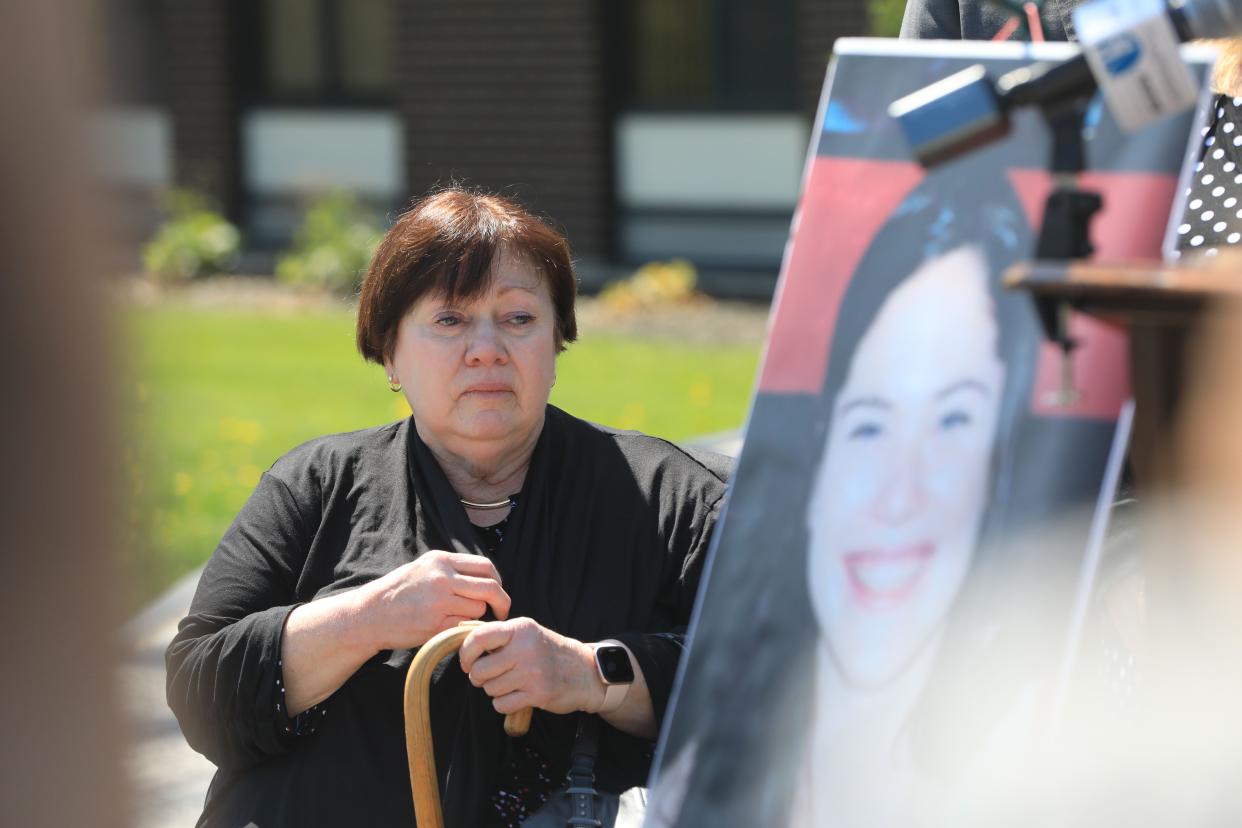
The report says the conversation left Kolek feeling Hoovler would never put the case before a grand jury.
Having hung up with Kolek, Hoovler apparently picked up the phone and called ADA Kelly, who was meeting with Investigator Corletta. Kelly’s boss was yelling so loudly into the phone that Corletta could hear him as if he were on speakerphone.
Hoovler accused Kelly of backing the State Police. He asked what information Kelly and investigators had been sharing. He stressed that the FBI’s behavioral workup of Holley was inadmissible.
Kelly talked his boss down, saying he felt there was enough to prosecute. He offered bullet points to support that feeling and said that his memo could be presented as soon as Hoovler liked. Kelly offered to meet with Hoovler and talk him through all 26 pages.
By this point, Hoovler had calmed down, and the phone call ended. But the report adds a coda: “It was apparent that DA Hoovler was not aware of the facts of the case.”
Throughout the meetings with Natalizio and Corletta, the report says, Kelly had been clear that he had faith in the case, but he offered no guarantee that it would ever see a grand jury. Kelly faced “several roadblocks in his office, referring to executive assistant district attorneys,” including Christopher Borek and Stu Rosenwasser.
There were two guarantees at the district attorney’s office, Kelly said, according to the report.
First, Hoovler was sure he did not have to recuse himself.
Second: Everything was run by Hoovler.
State police bypass the DA
State Police made the extraordinary decision to bypass the grand jury, but not before seeking guidance elsewhere.
On April 12, 2023, New York State Police Maj. Paul DeQuarto, Capt. Joe Kolek, Natalizio and Lt. Christopher Williams presented the case to members of the New York State Attorney General’s Office. Also on the call was State Police third in command Field Commander Col. Richard S. Allen and Division Counsel John Czajka.
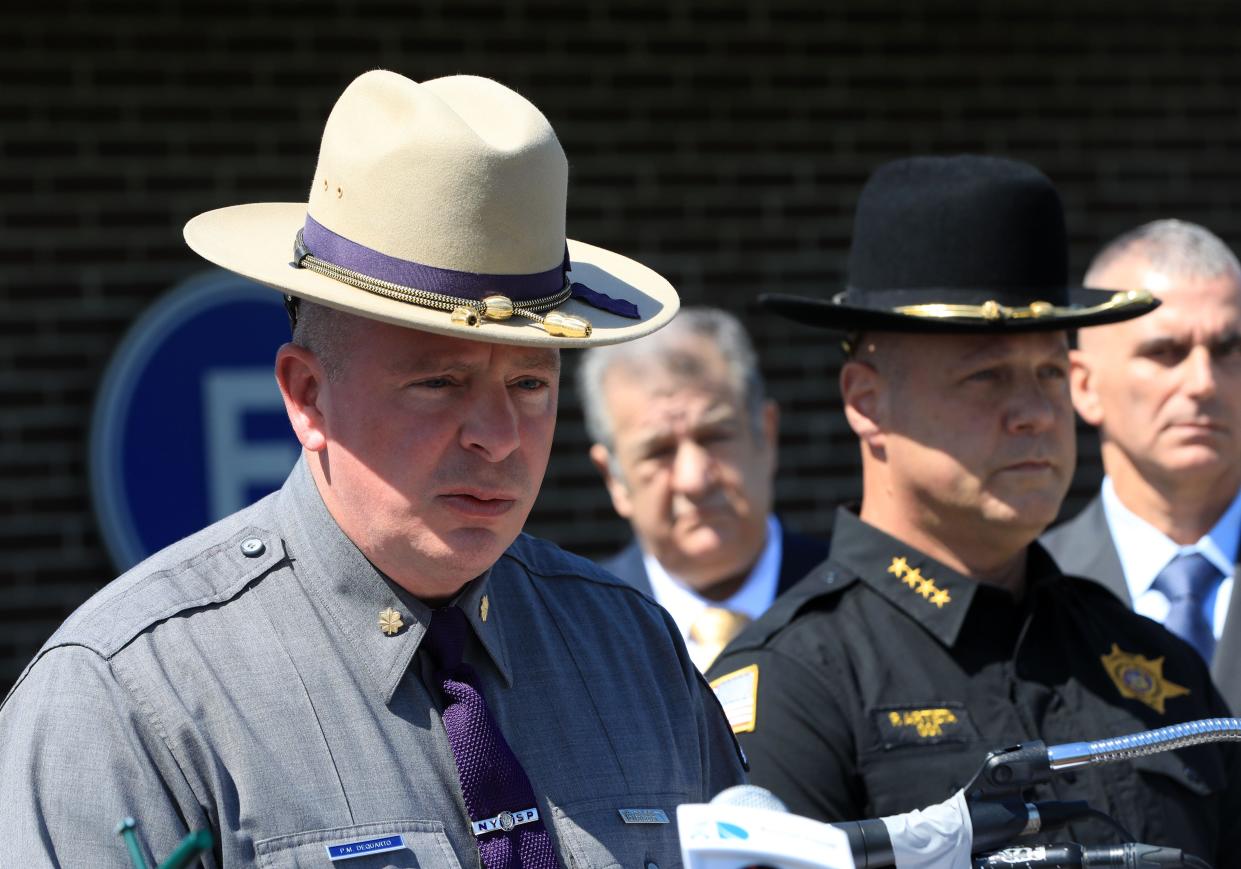
Some at the State Police saw this as a precursor to a formal request for the AG’s office to take a role in the McDonald case. But the AG’s office says no formal referral ever came.
Natalizio’s report says the Attorney General’s office asked Hoovler to recuse himself and that Hoovler declined. But the AG’s office disputes that, saying no such call to Hoovler took place.
Betty Jo McDonald, Megan's mother, had waited 20 long years for an answer. Her daughter’s megawatt smile still beamed from billboards and flyers seeking “Justice for Megan” and offering a reward for information leading to an arrest.
Then, on April 20, 2023, an arrest came.
Instead of an indictment, State Police Investigator Michael Corletta issued a 17-page felony complaint laying out the case against Holley, effectively doing an end-run around Hoovler.
Holley was arrested at the county jail, where he was in custody on a drug charge. He was transported to the Troop F barracks. The handcuffed Holley, who lost the use of his legs in a 2007 car crash, was wheeled out past a media crush. He declared his innocence before being whisked away to his arraignment.
Then a podium was set up, flanked by oversized photos of McDonald and Holley. With no DA present, State Police brass spoke, praising the legwork it took to deliver the second-degree murder charge.
Betty Jo McDonald sat silently to the right of the podium — 20 years, 1 month and 5 days after the day that changed everything, the day she learned her daughter’s grisly fate. This day, she would not speak. That job fell to her daughter, Karen, and her son-in-law, James Whalen.
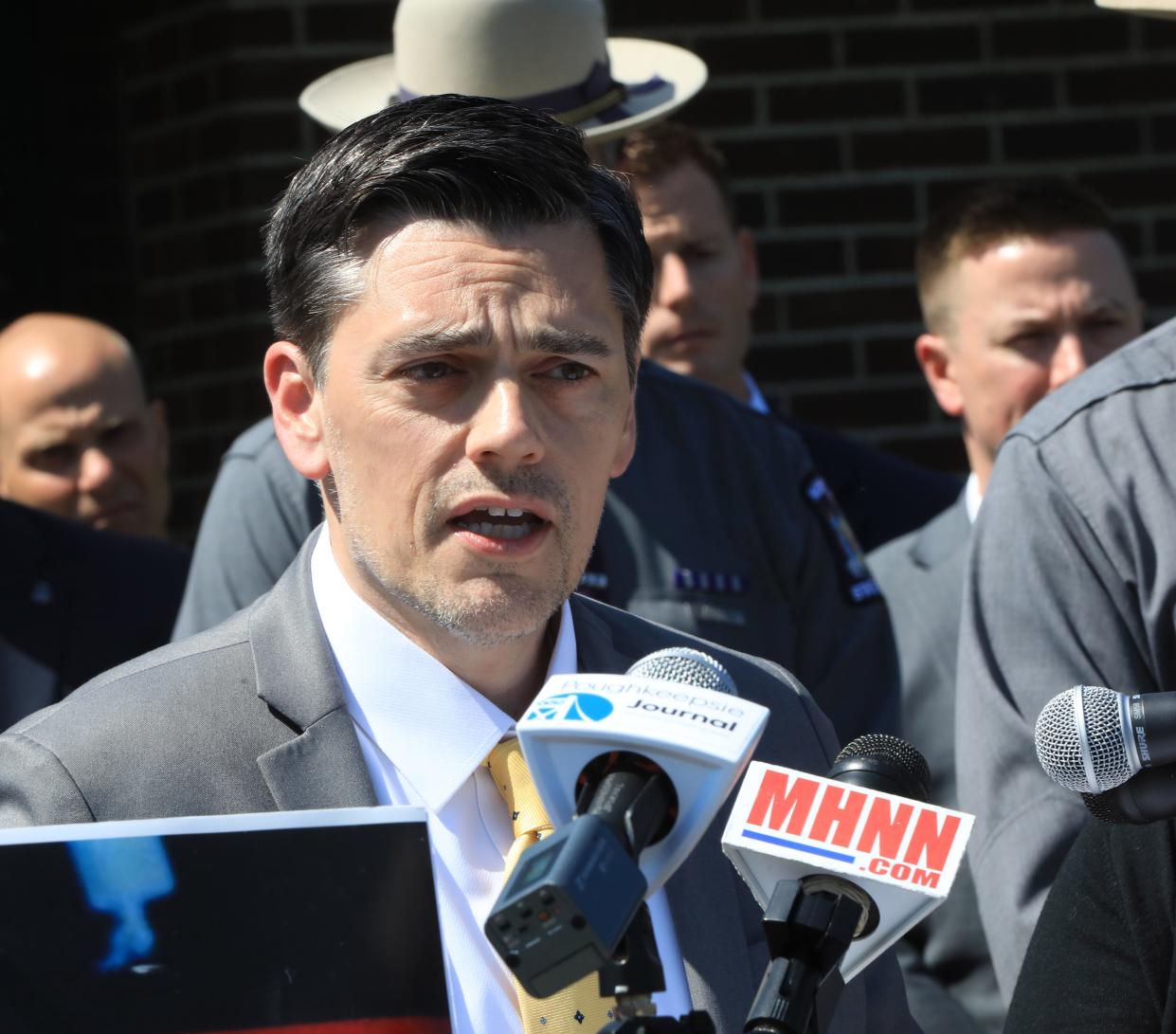
It was James Whalen who delivered another atypical moment in what had become an atypical case. In a sign that the family had been alerted to Hoovler’s intransigence on the case, or had become suspicious of the DA, Whalen looked out at the media and put Hoovler on notice.
"We say today, all eyes are now on you,” he said, addressing the absent DA. “We are all watching: Megan's family, the community and the media. Justice for Megan does not only mean handcuffs at this point. This monster, this coward, has been able to live free nearly as long as Megan was alive on this earth. Megan's family will continue the fight."
Within minutes, Hoovler issued a press release, saying his office had been told no arrest would be made “without prior consultation with our office.”
The arrest had started a clock, Hoovler said: Holley would have to be indicted by a grand jury within six days or be released as soon as his drug sentence ended.
The DA breaks the news to the McDonald family
Five days later, on April 25, 2023, Hoovler summoned the McDonald family to the Government Center in Goshen. He had invited several members of his executive staff, as well, too many people for the meeting to be held in his office on the fourth floor.
Instead, the meeting was moved to the third floor, meaning that Hoovler would tell Megan McDonald's family he wasn't taking her murder case to the grand jury — in the grand jury room.
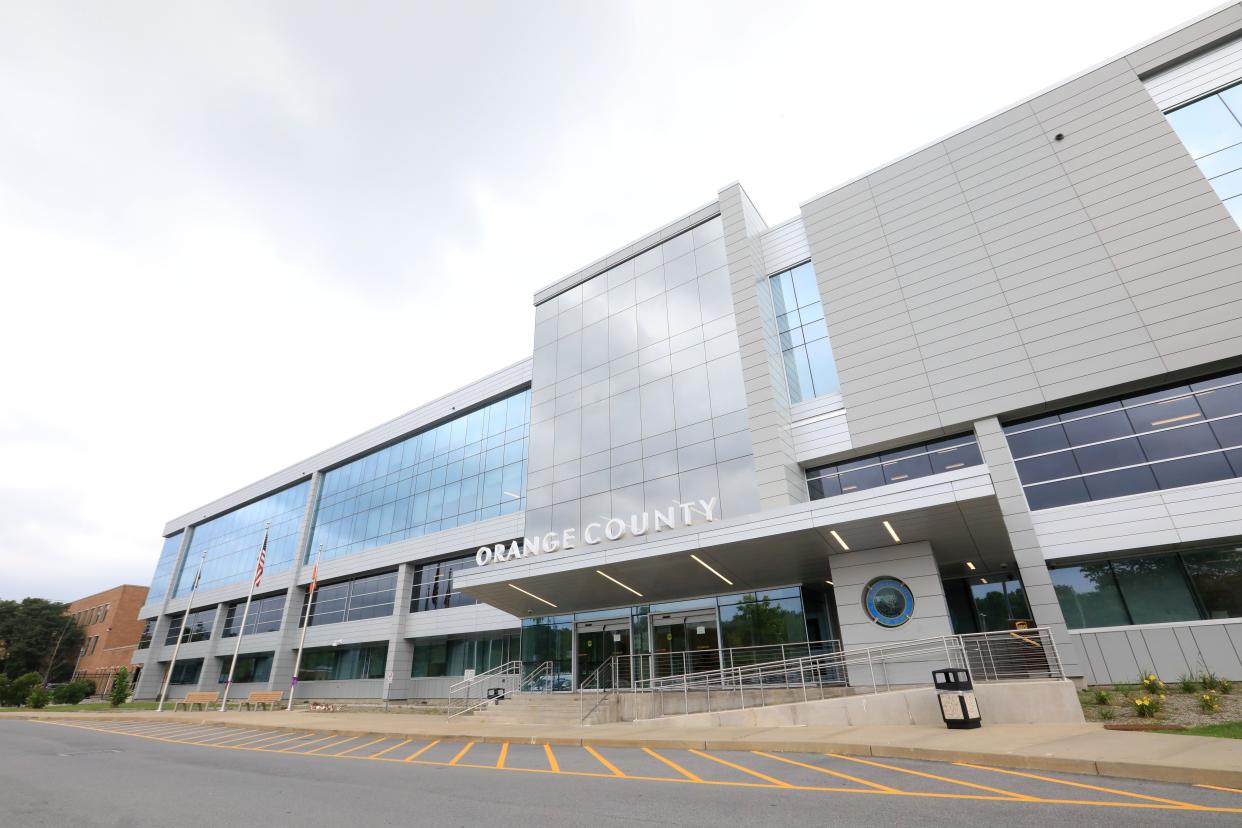
The next day, Hoovler did what he had said all along he would not do: He formally recused himself and his office from the case and asked for a special prosecutor. Enter Cornachio and Laura Murphy, who had led the Westchester DA’s Cold Case Bureau.
The same day, Holley, who had served his time on the drug conviction and has declared himself innocent of the McDonald homicide, was released by Wallkill Town Judge Peter W. Green.
While some saw Holley’s release as a setback — one website called it a “shocking screw-up” — the State Police took the longer view: Their arrest, while failing to keep Holley behind bars, meant that he couldn’t leave the area.
They had charged their man, Holley, and they had gotten past the man they were convinced had stood in their way, Hoovler.
All of this left Paul Weber, Holley’s attorney, scratching his head.
“There's something more going on here,” Weber said outside Wallkill court on the day Hoovler punted the case. “I don't know if it's the DA and the State Police are butting heads, but there's something going on here with this case.”
The State Police narrative offers one view of what was going on.
Edward Holley's lawyer sees 'blame game'
Weber, in a recent interview, questioned the motive behind the internal report.
"Unless the State Police take action on the allegations they are making (against Hoovler and Brown), the document is nothing more than a 'blame game,' a way for the State Police to save face when this whole case goes down the tubes," he said.
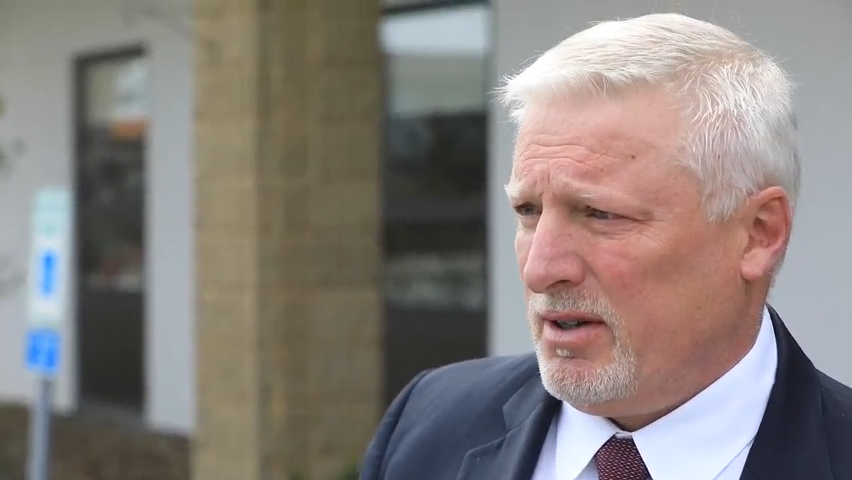
It is akin to the police saying "It wasn't our fault. It was the DA's fault. He obstructed the investigation," Weber said.
"And the DA will do the same thing to the State Police: 'It wasn't our fault. It was a bad case and the State Police should have never made the arrest. Meanwhile, Mr. Holley's name and reputation get dragged through the mud."
In the January 2024 interview, Hoovler again defended his actions fully.
“Police and prosecution in many cases appear to be aligned on paper, but in reality, when it comes to a lot of things, they're adverse because we're looking for proof beyond a reasonable doubt,” the DA said. “In every case I prosecute, probable cause means nothing. We're looking for proof beyond a reasonable doubt. And that ethical rule is very important: to exclude all others.”
He mentioned a maxim that hangs on his office wall: Wrongful arrests lead to wrongful convictions.
“Everyone in my office knows that. You have to be careful with what you do and that's what, in essence, I was trying to do with this,” he said.
“At the end of the day, it's real simple. I followed my ethical duties. I did what I had to do. And the state police essentially took action without telling us. And that's the position we're in today,” Hoovler said.
Toe to toe on Shawangunk Lake Road
It’s March 29, 2023. David Hoovler had just watched State Police divers comb Shawangunk Lake Reservoir looking for the Stanley ball-peen hammer he first identified as the murder weapon 15 years ago.
He had read the probable-cause memo that said the case was ready for grand jury.
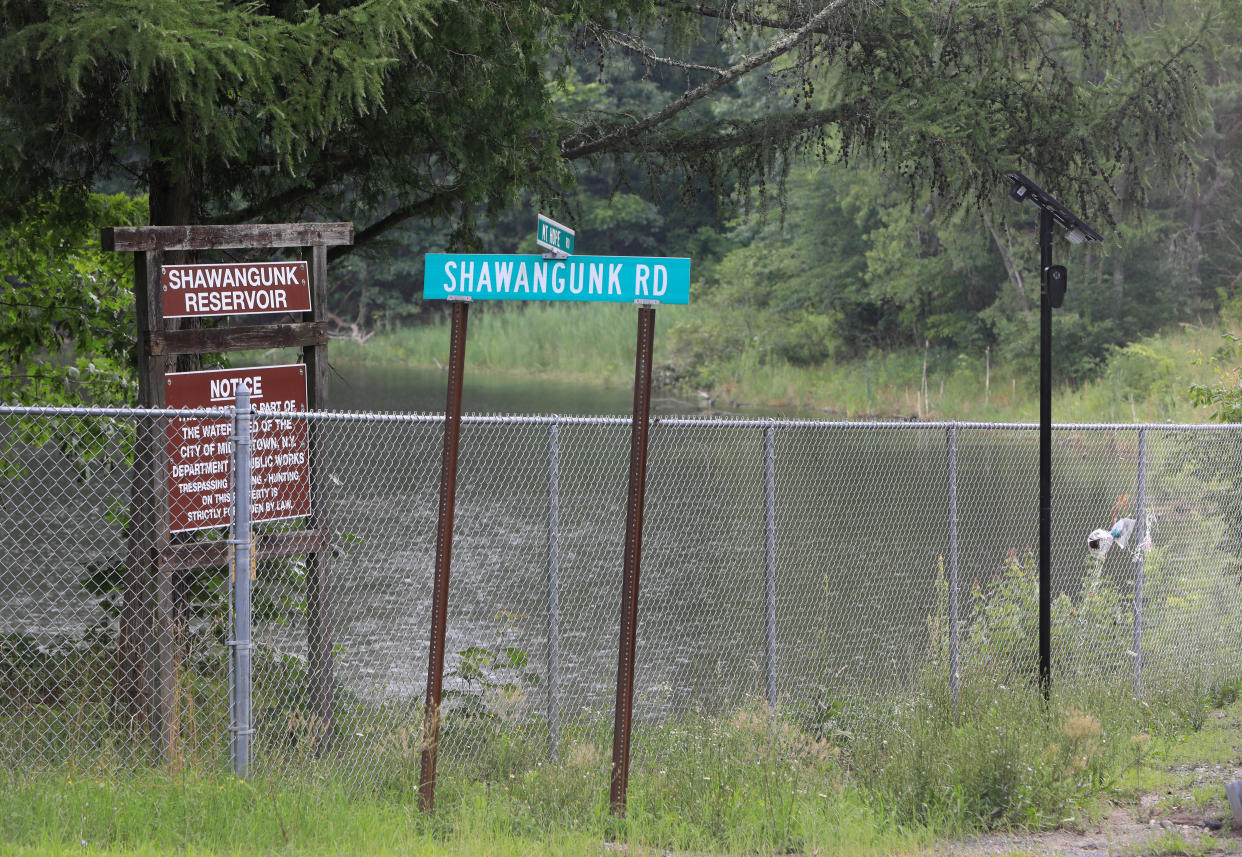
State Police Capt. Joe Kolek stood with Hoovler and — in a conversation that appears verbatim in the internal report, suggesting it was recorded — asked him, simply: “Dave, where are you at with this?”
Hoovler was adamant. Without a confession, they could lose this case.
“I’m 1-2 in circumstantial cases and we cannot lose. We can’t lose,” Hoovler said. “What happens then?”
“So then you’re 1-3 and Megan’s family will respect you and the State Police will respect you,” Kolek replied. “We would rather try and lose than never try at all.”
Hoovler’s attitude in 2023 was a far cry from 2004, when as a brash 36-year-old prosecutor, he told the Times Herald-Record about his appetite for arson cases. They were hard to prove, he said, but that’s exactly why he liked them.
“I would rather lose a difficult case, like an arson, than try a ‘gimme,’” he said. “If you’re trying a ‘gimme,’ you’re probably not doing justice.”
At the reservoir in 2023, Hoover talked a different game.
“As of right now we’re not there,” the prosecutor told the captain. “If we wait, it will get there. I promise you that at some point before you retire and I’m no longer the DA this will be solved.”
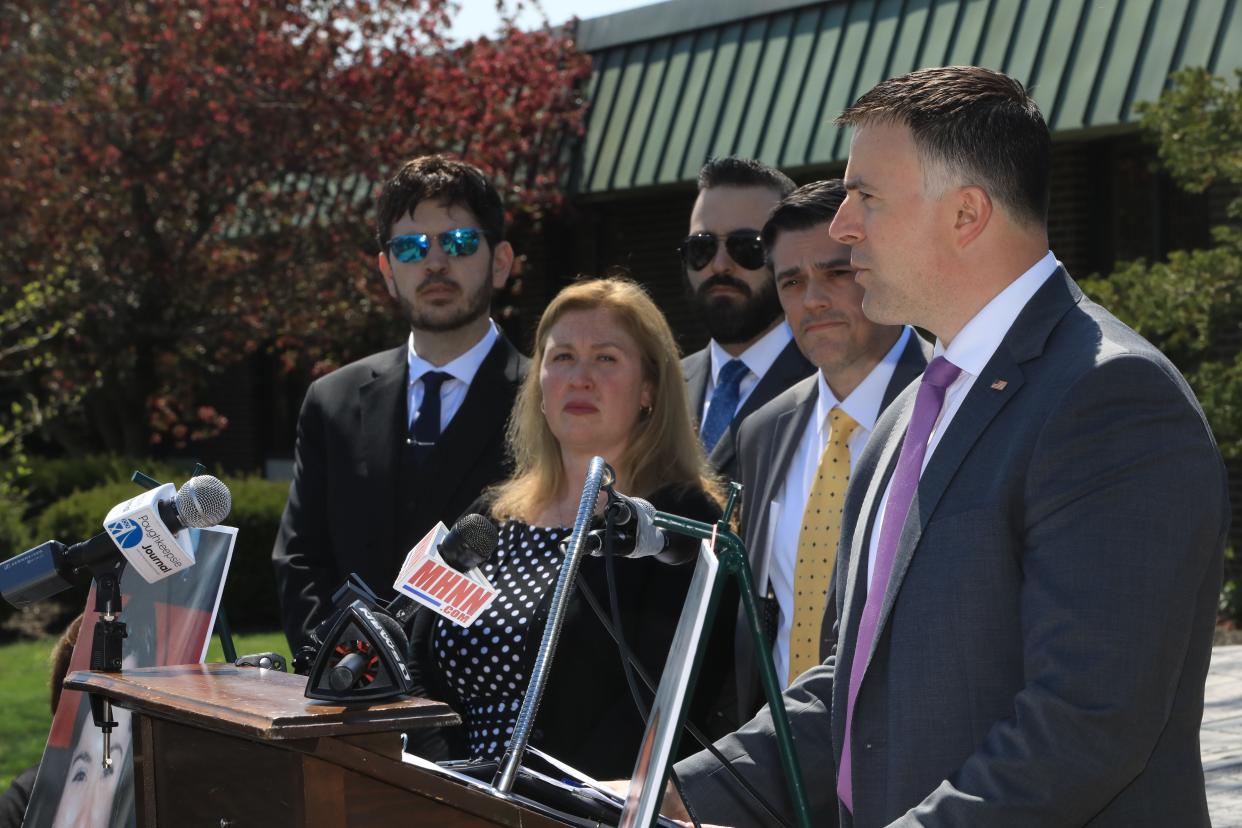
Kolek replied: “Dave, again I just want to be up front with you that is not where the State Police is at. We’re not waiting.”
He told Hoovler that he had faith. “We believe that you and your office can get this to the finish line.”
It was his call to make, Hoovler said, and his call was no.
Three weeks later, Edward Holley was arrested and charged with second-degree murder in the death of Megan McDonald. Hoovler recused himself and his office.
Now, it’s Special Prosecutor Julia Cornachio’s call to make. She secured an indictment.
And David Hoovler is on the outside looking in.
Reach Peter D. Kramer at pkramer@gannett.com.Support this kind of journalism by subscribing, at subscribe.lohud.com.
This article originally appeared on Rockland/Westchester Journal News: Megan McDonald murder: DA David Hoovler tampered with case, report says
